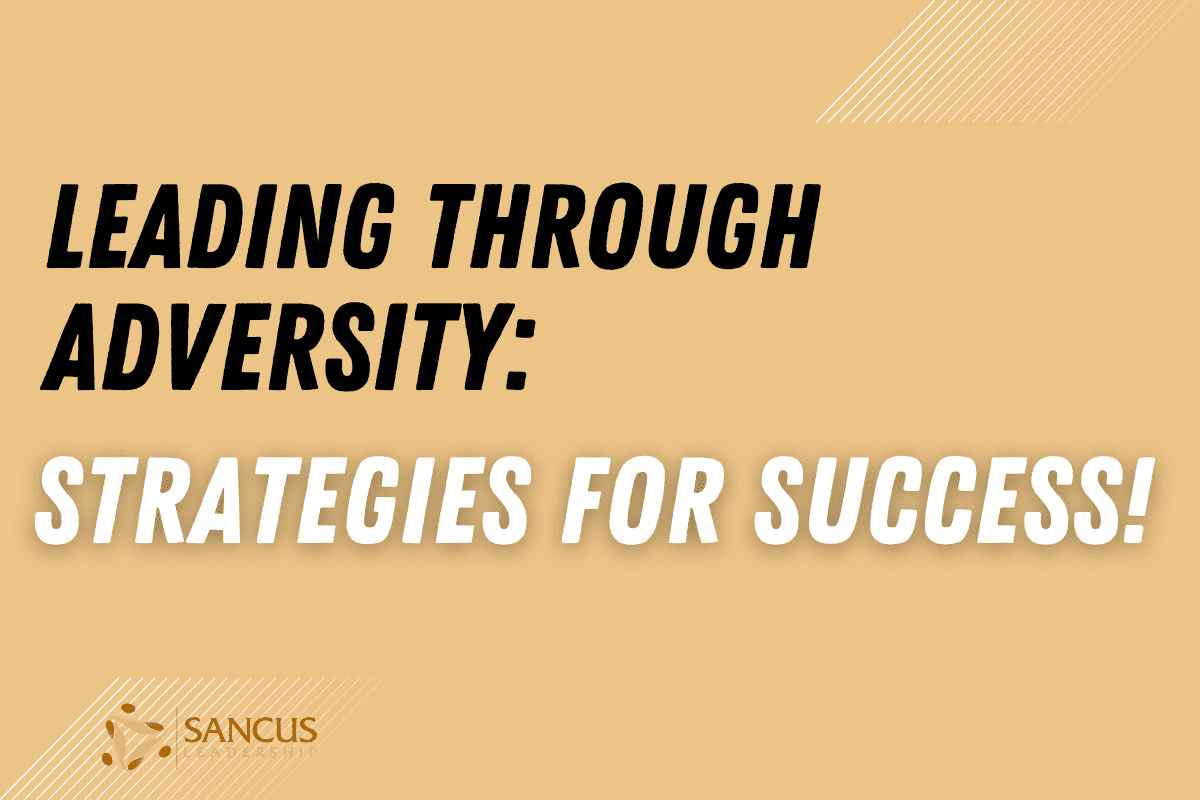Adversity is significant in leadership; it is through tough times that we are forced to become better leaders; when the stakes are high, so are the potential wins! In every training session at Sancus Leadership, trust, and adversity are the main building blocks. Adversity will align the atoms of your leadership and make you the best possible leader! When carbon is put under pressure and heat, the atoms align and create one of the strongest materials known to man, diamonds.
Adversity makes you a better leader by getting you out of your comfort zone, making you think proactively, showing you your strengths (and weaknesses), and making you appreciative of your resources. However, this only applies if you approach adversity with an opportunity-focused attitude.
In this article, I’ll make a case for how adversity can positively change and influence your leadership skills – specifically if you’re in charge of small teams or a budding organization. So, if this applies to you, do read on!
How Adversity Will Make You a Better Leader

In this section, I’ll list several ways adversity can help shape you into a better leader. Not all adverse situations will necessarily benefit you this way. Still, if you keep the right attitude, more often than not, you’ll be able to gain something positive out of adversity.
Adversity Helps You Grow
One of the biggest reasons I believe adversity will make a great leader is that it gets you out of your comfort zone. Outside the comfort zone lies adventure, excitement, and purpose.
Outside the comfort zone lies adventure, excitement, and purpose.
I like Aimee Mullins’ quote, “Adversity is just change that we haven’t adapted ourselves to yet,” not just because I think it articulates an important truth but also because it helps us think about adversity in a much more constructive and productive way.
And if you think about it, adversity is only another name for a change. The fact that you’re having a tough time dealing with it should tell you it has brought you out of your comfort zone.
That’s where the real growth happens – you can only expect yourself to know or do better if you stay where you’re comfortable. No, you need to be challenged and pushed for you to get yourself to do better than you are!
In addition, adversity exposes you to “optimal stress.” This is the level of stress that lies in the sweet spot between the high and low extremes.
Why do we need some level of stress? Well, it turns out that too little stress in our lives can cause us to become lethargic, bored, and depressed. We need some pressure to get ourselves out and about and be productive. That’s how adversity facilitates your growth.
Adversity Makes You Proactive

Another way your leadership skills benefit significantly from adversity is that it teaches you to be more proactive.
When you go through a tough time, you realize you have let yourself get comfortable with how things were and stopped thinking about how they would look in the future.
You realize this complacency left you vulnerable to the issue you’re facing now, and you resolve to actively think about possible future problems and contingencies you might have to face.
This helps you anticipate opportunities and risks you and your team might face, allowing you to prepare for those problems and opportunities in time.
Adversity Holds a Mirror to You
Another reason why adversity can help mold you into a better leader is that it holds a mirror to you by showing you your strengths and weaknesses.
When surfing through life without a care in the world, it’s easy to believe you’re equipped with the skills and resources you need to face the future. But in the face of adversity, all of this is tested, and you get to see where you stand in life.
It’s easy to believe you’re equipped with the skills and resources you need to face the future. But in the face of adversity, all of this is tested, and you get to see where you stand in life.
Think of it this way, would you be able to call yourself a competent pilot if you’ve never taken a plane off-ground? Can you call yourself a skilled captain if you’ve never taken a ship to sea? Of course not!
In the same way, the only way you can call yourself a competent leader is if you’ve tested your leadership skills and guided a team through a difficult time.
The only way you can call yourself a competent leader is if you’ve put your leadership skills to the test.
Adversity Makes You Appreciate Your Time & Resources
Appreciation and effective utilization of one’s time and resources are hallmark qualities of great leaders. And adversity does a great job of instilling this appreciation in people.
When everything’s going fine, you’re likely to be reckless with your time and resources, meaning you won’t make the most of what you have. However, when times are tough and a lot is on the line, you have no choice but to make the most of your resources.
When times are tough and a lot is on the line, you have no choice but to make the most of your resources.
For example, we were all guilty of wasting our time doing anything but studying throughout the semester, only to spend several sleepless nights trying to learn as much as we could during exam season.
Moments of intense pressure like these help you realize that it’s a mistake to waste time and resources when things seem manageable. And once this realization hits you, you’ll see yourself become a much more responsible person and, by extension, a leader.
Adversity Helps You Become Decisive
When times are easy, you can afford to be indecisive about things. Even if you take your time evaluating the pros and cons or procrastinate on making the decision, there’s little at stake.
However, when there’s a lot to lose, and you’re required to make important decisions quickly, you learn to quickly access important information and prioritize the moment’s needs to reach a decision quickly.
This skill is crucial for you if you’re responsible for leading a team through a tough time.
In that position, it’s hard to understand what each team member thinks you should do. So, it would help if you learned to trust your abilities to evaluate situations and find the best solution with your resources. And this is exactly what leading through tough times is all about.
Overcoming Difficulty Gives You Confidence in Your Abilities
Another significant way adversity shapes you as a leader is that it gives confidence in your abilities. You get proof of your competence when you see yourself lead your team through a difficult time and survive a challenging situation.
I experienced this proof of competence firsthand with my Bomb Disposal team; I have never been more proud of myself! Bringing that team together and solving all those deployments while maintaining a high level of trust was one of the most significant achievements of my life!
This proof allows you to trust yourself to lead your team through any future problems you must confront.
Why is this trust important? To lead people through difficult times, you need them to put their trust in you, and you can’t get others to put their trust in you if you don’t do so yourself.
At Sancus Leadership, we put trust as the foundation of every team; without trust, there is no team.
When you are ready to stop wasting time on indecisiveness and instead want to start enjoying making tough decisions, I invite you to book a free leadership call with me!

Is Adversity Always Good?

Adversity is neither good nor bad; it is only one thing, inevitable!
I’ve talked about adversity in a positive light and made arguments for how it has a lot of utility in honing our leadership skills.
However, I’m not trying to glorify adversity- the point of our discussion in the previous section was only to highlight the often-overlooked ways adversity can come in handy if viewed positively.
Adversity is neither good nor bad; it is only one thing. Inevitable!
But that’s not to say that adversity is necessarily good for you in all situations; no, sometimes, all adversity does is knock you down and set you back with relatively few benefits to set that off with.
It’s really important to recognize this because it allows you to have a realistic assessment of your circumstances instead of naively optimistic ones.
I’ve identified three instances where you won’t benefit from adversity in any of the ways I mentioned in the previous section. This isn’t an exhaustive list of cases where adversity does more harm than good, but these examples will help you understand my point.
Adversity Is Bad When It Is Sudden and Excessive
The first instance where adversity is more counterproductive than beneficial is when it is sudden and excessive.
By sudden adversity, I’m referring to situations that could not have been anticipated by anyone beforehand- even by the most proactive of minds.
And by extreme adversity, I mean adversity that causes significant and unignorable turbulence in your life.
For example, an earthquake wrecking your office building would be sudden and excessive. “Sudden” because even the most agile of minds can’t predict earthquakes, and “excessive” because damage to office premises is a significant setback that takes time, money, and resources to recover from.
As your team leader, you’re unlikely to benefit in any vital way from adversity like this. For example, it’s not like you can train your team to prevent future earthquakes or other natural disasters.
Additionally, when the setback is excessive, i.e., your office premises getting wrecked, sometimes, teams can’t recover from adversity like this- no matter how competent their leader is.
This is the first kind of adversity that, I argue, tends to do more harm than good.
Adversity Is Bad When There’s Nothing You Can Do About It
My experience of twelve years in the army with multiple international deployments tells me adversity serves you no utility when there’s nothing you can do to recover from the situation- either by working around it or working through it.
An example of this kind of adversity would be what restaurants faced when the world went into lockdown due to the Covid-19 pandemic.
Public gatherings were largely banned during that time, so restaurants suffered immensely because the business model depended on people coming in and eating together.
Was this something they could work around or work through? Not really, during strict lockdowns, there was no way customers could go to restaurants, so even the best of managers and leaders could do nothing but “wait it out.”
Now, the pandemic was a teachable moment for many businesses, i.e., it taught them the importance of establishing an online presence and handling their communication and operations online. But if you think about it, these lessons don’t apply to restaurants at all.
Firstly, you must be physically present in a kitchen to make food, so you can only partially take your operations online. Secondly, restaurants were fine trying to reach people online since people generally avoided ordering food out of panic.
Not if the world undergoes another pandemic in the future, people will avoid restaurants the same way, and there’s not much their managers can do to ease the situation.
Sometimes, certain situations are simply unbeatable, and no level of competent leadership can do anything about it.
Sometimes, certain situations are simply unbeatable, and no level of competent leadership can do anything about it.
Adversity Is Bad When You’re Not Looking for the Opportunities
The third situation where adversity will do you more harm than good is when you don’t have the right attitude.
It doesn’t matter how small or large your problem is. If you approach it with a problems-focused attitude, you won’t benefit from it in any way.
This is because to gain anything from adversity, you must look beyond its face value and search for hidden opportunities and insights. And you can’t do this if you’ve labeled the situation horrible and fruitless.
In other words, treating problems like “setbacks” stops you from trying to look for the good that can root in them. As a result, you become less adaptive and turn your back to (what could be) incredible opportunities.
When the demand for your product/ service is low, you, as the leader of your business, can either sulk about it and pity yourself or investigate why this is happening and find out what’s losing you, customers.
The former will do nothing to help your situation. Still, the latter will help you adapt better to your customers’ changing needs and possibly even get you an edge over your competitors.
Adversity will always show you your limits, but whether or not you work to overcome them is a matter of attitude.
Adversity will always show you your limits, but whether or not you work to overcome them is a matter of attitude.
If you want to learn more about what you can do to be a more adaptive leader in the face of adversity, I highly recommend you read Stephen Covey’s book “The 7 Habits of Highly Effective People” from Amazon.com. It talks about attitudes and behaviors that are indispensable for effective leaders.
| Is Adversity Always Good? | Description |
| Adversity Is Bad When It Is Sudden and Excessive | Adversity is necessarily good for you in all situations; no, sometimes, all adversity does is knock you down and set you back with relatively few benefits to set that off with. |
| Adversity Is Bad When There’s Nothing You Can Do About It | Adversity serves you no utility when there’s nothing you can do to recover from the situation- either by working around it or working through it. |
| Adversity Is Bad When You’re Not Looking For The Opportunities | It doesn’t matter how small or large your problem is. If you approach it with a problems-focused attitude, you won’t benefit from it in any way. |
Here is a talk by Marcus Aurelius Andersen discussing how we can use the adversities we face to become better individuals.
Conclusion
In summary, while adverse situations certainly aren’t pleasant, they can do a lot to help you grow as both an individual and a leader. Specifically, it will help you:
- Get out of your comfort zone and grow.
- Make you think proactively.
- Show you your true strengths and weaknesses.
- Appreciate and effectively utilize your time and resources.
- Be more decisive and confident in your abilities.



